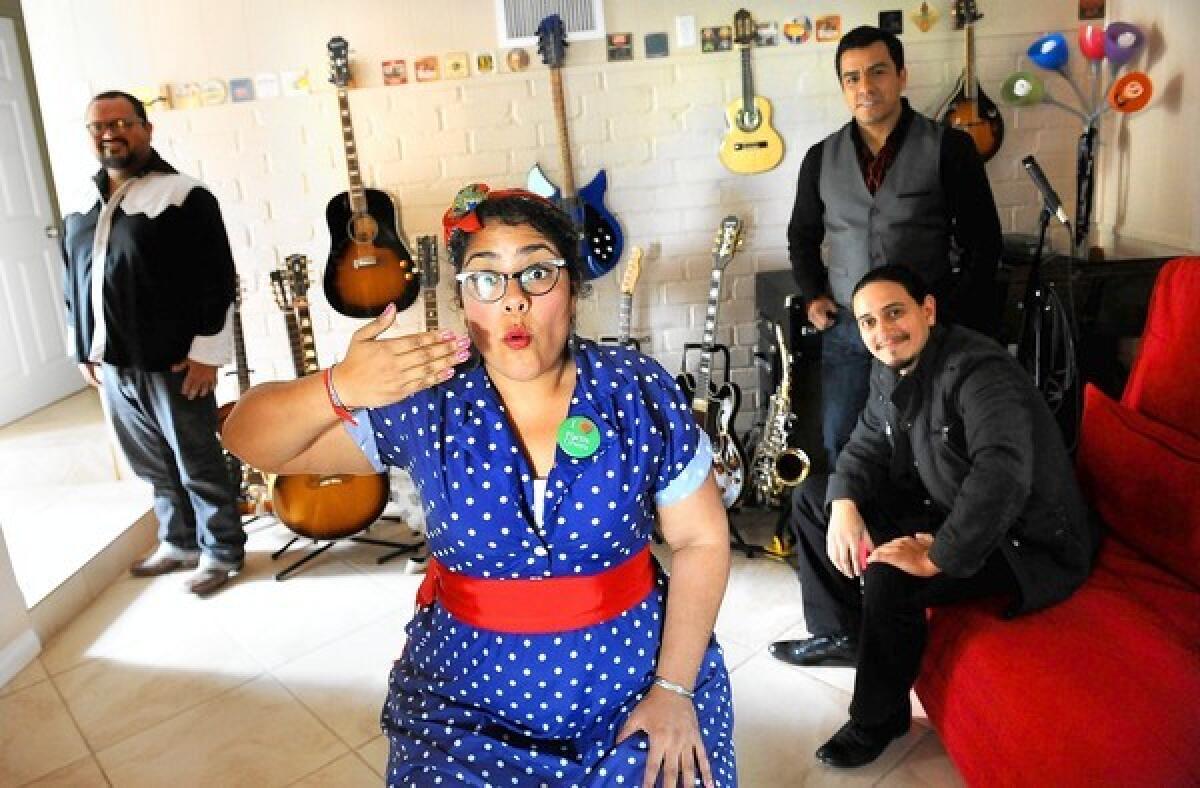La Santa Cecilia strikes a fiercely personal note in ‘Treinta Dias’

The cast of characters in La Santa Cecilia’s melancholy but biting new song “El Hielo (ICE)” are trying to stay out of trouble while living in the shadows of U.S. society.
There’s Eva, a housekeeper; José, a gardener who can make a yard “look like Disneyland” but “drives an old truck without a license”; and Martha, who “arrived as a child and dreams of going to school/ But it’s hard for her without proper documentation.”
The Spanish-language protest tune, off the L.A. band’s new album “Treinta Días” (Thirty Days), cushions its message with a deceptively sensuous bossa nova beat and a delicately restrained lead vocal by Marisol Hernández, known as La Marisoul.
PHOTOS: Concert photos by The Times
But “El Hielo,” which translates to “the ice” and takes a whack at U.S. Immigration and Customs Enforcement (the “ICE” of the title), has a fiercely personal resonance for Hernández and her colleagues: accordion and requinto guitar player Jose “Pepe” Carlos; bassist Alex Bendaña; and percussionist Miguel Ramírez, all in their early 30s.
While some band members were born in the United States, others were brought here as children when their parents entered the U.S. without papers. Hernández said the character of Eva is based on her own mother.
“When we wrote the song, it was like tears and everyone’s getting choked up,” Ramírez recalled. “All of us have had experiences with ICE personally. My brother would tell me, ‘Yeah, man, before you were born, ICE would come and pound on the door, trying to get Mom.’”
Carlos, whose Oaxacan parents crossed the U.S. border when he was 6, says he knows first-hand about growing up as a second-class citizen. “You’re not valued by what you offer to this country. You’re valued by if you have a nine-digit number,” said the soft-spoken musician.
Since its release this spring, “El Hielo” has been adopted as a kind of unofficial anthem of the immigration-reform movement. La Santa Cecilia has performed it at rallies around the country, including at an Olvera Street concert after the May Day march through downtown Los Angeles. The track helped propel “Treinta Días,” produced by Argentine American multiple Grammy Award winner Sebastian Krys, into the Top 10 of Billboard’s Latin Pop Albums.
CRITICS’ PICKS: What to watch, where to go, what to eat and more
Crafting a political shout-out is a somewhat unusual step for the band, named for the patron saint of music. La Santa Cecilia became a local club favorite in the mid-2000s with its exuberant, dance-friendly melange of rock, funk, cumbia, punk, samba, son jarocho and klezmer, woven together by La Marisoul’s sunny, ingenuous vocals. Although the band performs almost entirely in Spanish, its playful biculturalism shows in live-performance gestures such as a Spanish-language cover of “Strawberry Fields Forever.”
“We’re not like this politically driven band that’s like, ‘Yeah, we’re gonna change things and we’re gonna be all revolutionary!’” Ramírez said. “But I think the song is a big gift to us because it’s teaching us a lot about ourselves. It’s like a release valve. People take it and they see it and it hits them in a very human way.”
“Treinta Días” marks the band’s debut with the Universal Latino label, and Krys, who has followed the group since it was performing at La Cita Bar in downtown Los Angeles, believes it has arrived at a new level of artistic maturity.
“I’d go to La Cita and think, ‘Well, their music is kind of all over the place. But there’s a line out the door and around the block,’” Krys said during a recent get-together with the band at his studio-home in the Valley.
Krys, who has collaborated with Latin pop stars such as Gloria Estefan, Carlos Vives and Shakira, initially thought that La Santa Cecilia should sharpen its identity by concentrating on its regional-Mexican musical roots. “And then after a while it just sort of clicked: Well, this just is what it is. You either embrace it — don’t try to make something into something that it shouldn’t be,” he said.
PHOTOS: Iconic rock guitars and their owners
It was also Krys who suggested that “El Hielo” would work best if it veiled its political agenda in a pretty melody, a strategy used by Gilberto Gil, Caetano Veloso and other South American artists during the repressive 1960s and ‘70s. “You’re delivering this incredibly powerful message but you’re not hammering it down somebody’s throat,” said the producer.
For its part, the band appreciated Krys’ laid-back professionalism and his knowledge of how to negotiate the shoals of the music business. “He’s very calm, very mellow,” Hernández said. “He wasn’t like, ‘I’m this big-time producer and I’m going to make you famous.’”
“Treinta Días” has earned the band its best reviews. Besides “El Hielo,” the track that has drawn the most attention is “Losing Game,” a haunting, minor-key duet between Hernández and one of the band’s idols, Elvis Costello, who helped write the tune.
Krys, a friend of Costello, introduced the British rocker to the band a few years ago. Then Costello invited Hernández to perform a song with him, “Don’t Let Me Be Misunderstood,” during a concert at the Wiltern Theater. Hernández sang her part in Spanish.
Costello said by phone that he had come to know and admire La Santa Cecilia through its previous EP releases. He called “Losing Game” a “kind of reply” to a guest vocal appearance that Hernández will make on Costello’s forthcoming album with the neo-soul/hip-hop band the Roots.
Costello said that with “Treinta Días,” the band manages to convey the “verve and energy” of its live performances.
“That is a very hard thing to convert into a record that endures,” Costello said. “Because how many bands do you know that are great live, and then never, ever get captured on a record? They’ve managed to balance that on this record, the hint of which was only suggested on the previous recordings.”
La Santa Cecilia’s current incarnation is smaller than in the past, after the departure of guitarist Gloria Estrada and drummer Hugo Vargas. “We’re the last four gypsies that remain,” Ramírez said.
But although the band has cohered in new ways on “Treinta Días,” its members remain hesitant to analyze what makes a La Santa Cecilia record.
“I guess,” Hernández said, “we’re trying to figure it out still.”
More to Read
The biggest entertainment stories
Get our big stories about Hollywood, film, television, music, arts, culture and more right in your inbox as soon as they publish.
You may occasionally receive promotional content from the Los Angeles Times.











